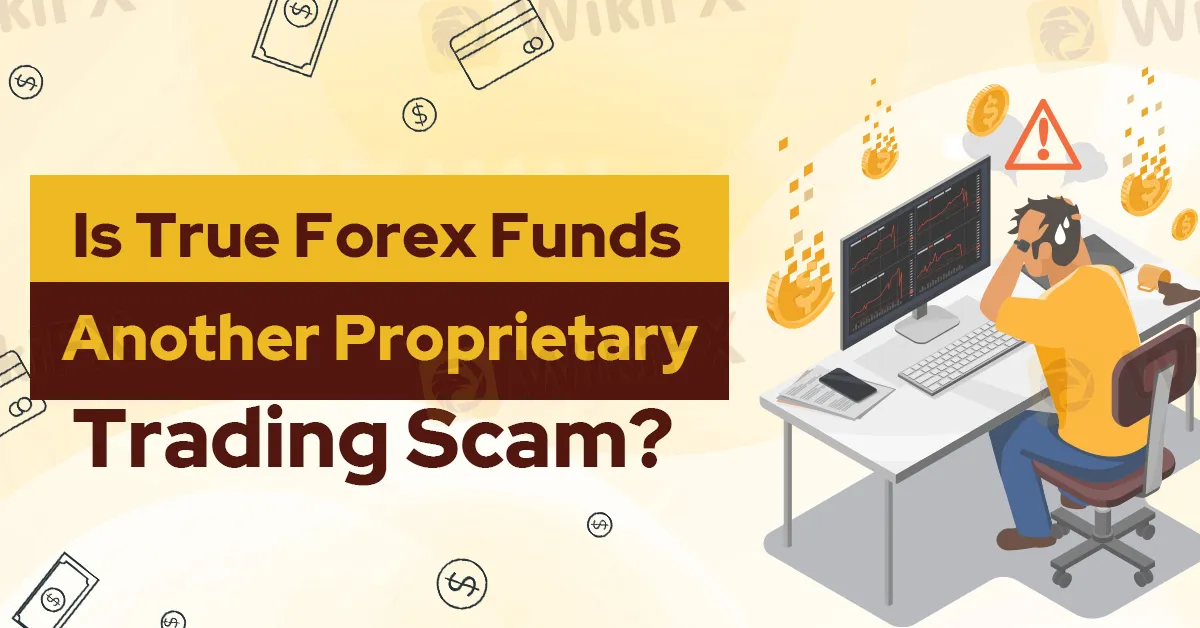简体中文
繁體中文
English
Pусский
日本語
ภาษาไทย
Tiếng Việt
Bahasa Indonesia
Español
हिन्दी
Filippiiniläinen
Français
Deutsch
Português
Türkçe
한국어
العربية
Is True Forex Funds Another Proprietary Trading Scam?
Abstract:True Forex Funds faces upheaval as MetaQuotes terminates licenses, raising concerns about its practices; echoes recent disruptions in the proprietary trading sector, prompting scrutiny and regulatory questions.

True Forex Funds, a notable proprietary trading firm, has recently made headlines by announcing a “temporary halt” to its services. This abrupt decision came as a result of MetaQuotes, the developer behind the widely used MT4 and MT5 trading platforms, terminating the licenses of True Forex Funds.
Richard Nagy, the CEO of True Forex Funds, took the initiative to address the trading community, shedding light on the unexpected disruption. Nagy clarified that the license termination by MetaQuotes was linked to True Forex Funds' utilization of a third-party provider for equity synchronization. The third-party provider, in use since 2021, is alleged to have connected to MetaTrader's client terminal in a manner not entirely acceptable according to MetaQuotes' standards.
Expressing his frustration over MetaQuotes' sudden decision, Nagy highlighted the absence of any prior warnings or opportunities to replace the third-party provider. One of the core challenges faced by True Forex Funds was the difficulty in investigating a partner or supplier's source code for legitimacy, a pivotal issue in MetaQuotes' dispute.

Despite the setback, True Forex Funds has reassured its clients of its unwavering commitment to resolving the issue. The firm is actively engaged in efforts to persuade MetaQuotes to reinstate its licenses. However, Nagy also broached the topic of potentially migrating trading accounts to a different broker if negotiations prove unsuccessful. In anticipation of this, traders are advised to close their positions before the market closure to mitigate any discrepancies in offered symbols during the migration process.
This recent incident marks the second major disruption in the proprietary trading sector within the last few months, following the closure of Canada's My Forex Funds by US and Canadian regulators in September. The CFTC's lawsuit against My Forex Funds accused the firm, its CEO, and associated entities of engaging in fraudulent activities exceeding $300 million. The focus of the legal action was on deceptive practices in leveraged retail FX and commodity transactions. Traders Global, a component of My Forex Funds, allegedly acted as the counterparty to most customer trades, employing various tactics to impede customers' profitable trading.
The CFTC's complaint against My Forex Funds revealed a range of deceptive practices, including unjustly terminating customer accounts, providing misleading commission assessments, and executing customer orders at unfavorable prices using specialized software. The legal actions extended beyond the US, with the Ontario Securities Commission imposing a temporary cease-trade order against Traders Global and Kazmi.
The broader implications of this case raise pertinent questions about practices within the proprietary trading industry, particularly concerning drawdown rules and income generation from failed challenges—common features in many proprietary firms. As the case unfolds, there are aspects highlighted in the complaint that may be typical or common within the proprietary trading industry, creating a grey area in terms of regulatory scrutiny.
In conclusion, the recent developments surrounding True Forex Funds and the proprietary trading sector underscore the complexities and challenges faced by investors in the dynamic world of online trading. The unexpected disruptions and legal actions against prominent players in the industry highlight the need for increased vigilance among traders and regulatory bodies alike. As the industry navigates through these challenges, transparency and accountability become crucial elements for maintaining the integrity and trustworthiness of the online trading ecosystem.

Disclaimer:
The views in this article only represent the author's personal views, and do not constitute investment advice on this platform. This platform does not guarantee the accuracy, completeness and timeliness of the information in the article, and will not be liable for any loss caused by the use of or reliance on the information in the article.
Read more

New Year’s First Trade KOL Posting Challenge
Start the year with a bang and showcase your forex trading prowess in the New Year’s First Trade KOL Posting Challenge hosted by WikiFX! This exciting opportunity is designed specifically for Key Opinion Leaders (KOLs) who are ready to lead their teams and engage their followers in the world of forex trading.

Indonesia officially joins the BRICS countries
Indonesia's decision to join the BRICS group will not only enhance economic cooperation within BRICS countries but is also expected to have a profound impact on global trade, investment, and the currency system.

Attention! Goldman Sachs Cuts Gold Target to $2910
As the Fed slows rate cuts, gold's price growth may be limited. Goldman Sachs revised its short-term forecast, expecting gold to reach $3,000 per ounce by mid-2026.

Inflation Rebounds: ECB's Big Rate Cut Now Unlikely
German inflation has surged once again, exceeding the 2% target for the second consecutive time. The overall inflation rate for the Eurozone, which is expected to be released on Tuesday, is also likely to show a slight increase, diminishing expectations for a large interest rate cut by the European Central Bank (ECB).
WikiFX Broker
Latest News
Ghana Trader Jailed for $300K Forex and Crypto Scam
US Dollar Surge Dominates Forex Market
Hong Kong Police Bust Deepfake Crypto Scam Syndicate Involving $34 Million
Is it a good time to buy Korean Won with the current depreciation?
Pepperstone Sponsored the "Aston Martin Aramco Formula One Team"
ACY Securities Integrates MetaTrader 5 to Enhnace Copy Trading Service
Soegee Futures Review: Should You Trust This Broker?
Malaysian Pilot Loses RM1.36 Million in UVKXE Investment App Scam
Indonesia officially joins the BRICS countries
Attention! Goldman Sachs Cuts Gold Target to $2910
Currency Calculator







